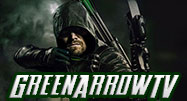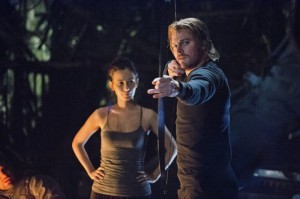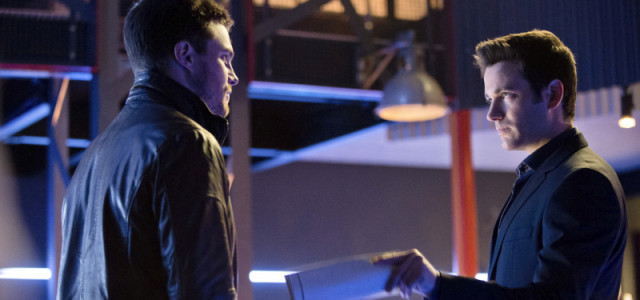
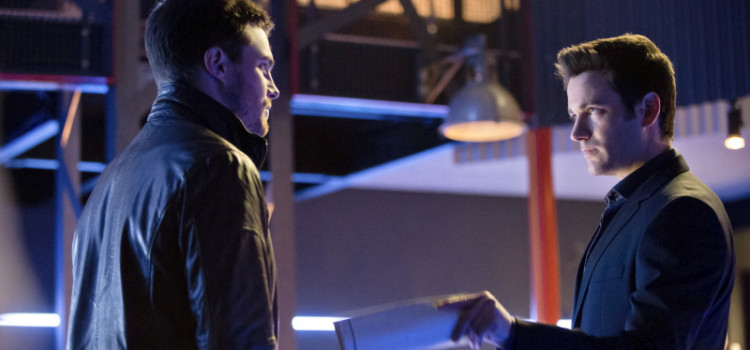
Arrow #1.19 “Unfinished Business” Recap & Review
Recaps & Reviews April 4, 2013 Derek B. Gayle

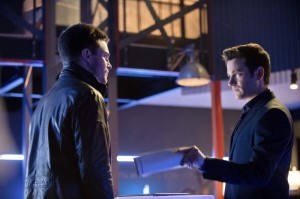 Summary: The Count is back and so is Vertigo, and that’s all well and good. But the the cracks among friends are the real stars of this episode, which does some great things with characters even in the face of a lackluster plot.
Summary: The Count is back and so is Vertigo, and that’s all well and good. But the the cracks among friends are the real stars of this episode, which does some great things with characters even in the face of a lackluster plot.
If you have not seen this episode yet and do not wish to be spoiled, do not continue reading!
Recap
After a girl overdoses on Vertigo in Oliver and Tommy’s nightclub, Oliver investigates The Count, who at first appears to still be insane after their last encounter, but then mysteriously escapes the institution. Meanwhile, Quentin believes Tommy is responsible for selling Vertigo, and conducts an investigation that could expose Oliver’s hideout under the club. Diggle investigates Floyd Lawton solo, against Oliver’s wishes. Oliver eventually discovers that The Count is still insane; his escape was faked by his doctor, who has been producing Vertigo himself. Diggle arrives and saves Oliver, who takes out the doctor but decides not to murder The Count. Tommy discovers that Oliver paid off the inspector of the club, believing that Tommy could have been the one selling Vertigo. Angry that Oliver still believes him to be the selfish person he once was, Tommy quits the club and asks for a job from his father.
Read an in-depth recap on our handy episode guide!
Review
Oliver Queen has been a character all about change since day one. The entire premise of the show is built on the conceit that the most careless, selfish boy could become a powerful, dedicated force for good given the right circumstances. It quickly became apparent that Oliver’s intense focus was not terribly interesting, though, and the show revealed that his less likeable early days were something of a gamble. We got a glimpse of what Oliver at his most successful would be like—a well-oiled machine narrowing down the list name-by-name, but ultimately inhuman and devoid of a soul. Oliver’s confidence has grown weaker over the course of the season as his heart has opened up, but not to the detriment of the show. It might lead to some misery from his perspective as a character, but it’s loads more interesting to watch than his cold solo act of the early days.
In fact, it’s become apparent that we graded this show on a curve early on, since a good episode in 2013 and a “good” episode in 2012 are two very different things. But it does justify much of what we saw established in the early, slightly-less entertaining days. Oliver’s life is actually more dreary now—the moral greys and heartache are the consequences of being more open—but the stronger character connections means a better show overall. It’s a testament to how imperative emotional connections to characters are; feeling for them when they’re down and haunted by their own decisions is much more effective for us than not feeling for them when they’re unwavering and relatively content. And that’s what makes “Unfinished Business” one of the more entertaining installments of the season, even in spite of a rather flimsy plot.
Oliver is still driven here, but for more personal reasons. And even though he’s got a good reason to have a vendetta against Vertigo, his drivenness is still displayed as being a source for contention. He’s had quite the struggle maintaining any semblance of balance between his vigilantism and reigniting relationships with his family and friends, and it’s no more on display than it is here. In this regard, Tommy’s decision to abandon Oliver and return to his father marks the strongest part of the episode. It’s a fair hurdle for Oliver to overcome—trusting the friend he’s chosen to entrust—even though the tactical maneuver of covering his bases in case Tommy did sell the Vertigo is perfectly logical. Logic and tactics don’t always work when it comes to relationships, no matter how much it might benefit whatever the present mission is, and it’s a lesson Oliver learned this time around.
However, Tommy’s rejection of Oliver is unfortunately a bit hindered by the two episodes that preceded it. “The Huntress Returns” killed much of the momentum of Tommy learning Oliver’s secret by having him come to terms way too quickly, and with the wrong aspect of it. That unfortunately makes his “I think you’re an awful murderer that I just tolerate” mindset feel like backtracking, even though this is exactly how his reaction should have continued to play out. “Salvation” had him mostly in the background, but he seemed to be just fine with covering for Oliver; a little hint that this uncertainty was still in the back of his head might have made this week’s developments more fluid.
But that aside, this is exactly what needed to happen with Tommy, both for the Green Goblin-esque story purposes and to play into how his character has been presented thus far. Tommy’s growth of a moral compass through Laurel and his father’s actions has gone on mostly in the background, but it’s revealing itself as a well put-together little arc. The character has come a long way quite quickly, and it’s a testament to Colin Donnell for bringing the obnoxious douche he was in the first few episodes to this level of likability. Tommy could easily come off as a sensitive prick here, but Donnell’s earnest performance, coupled with the unfolding truth that Tommy has essentially been the most honest and successful guys in the bunch in terms of reaching his “be a better person” goal, justifies Tommy’s frustration with the situation. Donnell is something of an unsung hero in the cast, clearly one of the most talented actors, but up until very recently he had the least screentime to prove it. Hopefully his parental affiliation only means he’ll get more range of material, and doesn’t mean we’re a step closer to his demise.
Another much-needed development was Diggle’s solo act and subsequent butting heads with Oliver. Diggle had become a little too complacent and thus less interesting as of late, but bringing Deadshot back into the fray was the perfect way to reignite David Ramsey’s spark. Diggle isn’t presented as obsessed so much as goal-oriented and personally invested, and it keeps Diggle’s actions sympathetic and understandable when he indirectly causes Oliver to fail, albiet temporarily. Like Tommy’s story, neither Diggle nor Oliver are painted as wrong; both have valid, important and personal concerns that simply don’t jibe with the other party. “Unfinished Business” puts forth a conscious effort to build upon the characters’ season-long concerns (Tommy’s insecurity, Diggle’s past and Oliver’s fanaticism) to reach a boiling point and create an organic rift in the relationships, rather than using just the plot-of-the-week to do it. It goes a long way to make the underlying bitterness and tension between friends feel warranted, and thus makes it harder to pick a side.
While the show has course-corrected nearly all of its characters, the Lances are still a problem. Laurel is fine this week in her limited screentime, and it was good to see her not used as a source of forced tension (she trusts Tommy and forgives her dad, so no extra drama on either side.) But Quentin is a character that’s constantly teetering on the edge of really great character development without ever achieving it (and I’m saying this as someone who’s been fiercely defensive of him in the past.) The show has tried to purport that he’s an overprotective dad struggling to overcome his prejudices for the sake of his daughter, as spelled out by his totally unsubtle final scene where they actually say how he’s grown by not drinking away his despair. But he’s gone back and forth so much now; he’s almost trusted the Hood on a few occasions, he’s almost put his past behind him, he’s almost trusted his daughter, but he’s also committed some of his most despicable acts in between all those things. The emotional stuff with his wife and daughter last week wasn’t even brought up once here, which minimizes any of that importance.
There’s an underlying tragedy in this week’s events, as Quentin is (again) completely validated in his suspicions, but it’s become harder and harder to find sympathy for him when he inevitably fails. One redeeming quality of his part in this story is how much he references breaking his daughter’s trust, thus far the worst act he’s committed, but it doesn’t seem to affect his choices in any way. Laurel treats this situation like it was different by saying she forgives him, and Quentin says he knows he has a problem with obsession. They keep talking about their problems, but neither are doing anything about them; Quentin referencing getting hung up on The Hood was almost a non-sequitur in the conversation, in fact. Ishmael isn’t known for his obsession with Moby Dick because he stated that he was obsessed, he showed it through his actions, which in turn informed his character. We’ve seen Quentin be obsessive and dirty, and he says he cares about his daughter, but those character beats haven’t been turned around to create a meaningful story for him, other than him telling us he’s conflicted. It’s frustrating, because Blackthorne and Cassidy continue to have great chemistry and pulled out decent performances this week, but it’s hard to care when Lance has spent 19 episodes going in circles. A nice effort was put forth here to play out his story a little differently, but it’s still not enough to push his character into relevance.
The Vertigo storyline jumpstarted great character stuff this week, but that flimsy plot might have been the weakest part of the episode. That The Count was a red herring was decently shocking, I guess—though the lack of Seth Gabel onscreen certainly sparked suspicions that all was not as it seemed—but the doctor reveal still felt a bit hackneyed. It didn’t harm the episode much, it was just the same kind of “forced surprise villain” that Smallville liked to do in its middle years, which always yielded a rushed, forgettable climax with little emotional resonance. It’s a cheap way to avoid fleshing out a villain, but it did lead to the important moment where Oliver decided not to murder The Count. Oliver’s qualms with murder have been the throughline during these last three otherwise unrelated episodes, and it’s proving to be an unexpectedly engaging development.
“Unexpectedly engaging development” is a good summary for this episode, actually; we came for the return of The Count, but stayed for the much more interesting and surprising relationship drama. Oliver and Diggle may have repaired their partnership, but the cracks are certainly showing. And Tommy’s reunion with his father is a great springboard into the final episodes, which are sure to be quite Merlyn-centric in the best possible way if this keeps up.
Odds & Ends
-
The flashback didn’t contribute much to the episode, but it’s worth noting that they continue to be endlessly more entertaining lately with the new Oliver/Slade/Shado trio, even when they’re without much conflict aside from petty bickering. Celina Jade is great as Shado, able to keep the otherwise daunting and predictable Weird Training and Mystical Japanese Fables much more fun to watch.
-
I love when the show parodies its own terrible “You have failed this city!” mantra, as The Count does when he maniacally repeats it. I also like that these subversions mean the phrase itself is on its way out come next season.
-
I enjoyed Gabel’s performance much, much more here than I did in “Vertigo,” perhaps because of his limited screentime, or because the mental state. Either way, it seems apparent that The Count works better as an enigma than a full-fledged character.
-
The fight with Oliver and Diggle against the doctor and his orderly was brief, but the dirty, on-the-floor grittiness was a nice change of pace.
-
The cinematography on Arrow is usually fairly standard, so when it does something mildly creative, like the circling around Laurel and Tommy in the club, it sticks out in a good way.
-
So why, exactly, did the doctor just stand there while Oliver shot three arrows at him? I get that he was confident, but yeesh.
- We’re all fans of Bryan Q. Miller around here, and his first episode of Arrow certainly didn’t let us down. Hopefully we’ll see him contributing more to the show from now on.
A SECOND OPINION
by Matt Tucker
“Unfinished Business” turns out to be an apropos title as this is an installment full of it. Aside from the reappearance of The Count and Vertigo on the streets to Diggle’s hunt for Deadshot, we have the slow simmering relationship between Oliver and Tommy coming to a boil. We have Oliver finally picking up a bow on the island. And we have set-up galore.
This was perhaps the oddest episode of the show to date. Not in content or structure but in feel and execution. And not in a bad way, just different. Deftly drawing on the writing talents of Smallville stalwart and comics scribe Bryan Q. Miller and longtime production staffer Lindsey Allen, this felt like an episode of a crime series well into its run. There was a lived-in quality that worked well for all of the relationships involved. Everyone seemed to be at each other’s throats and that propelled the narrative forward, even when the plotting seemed to slow down at points.
After recently feeling the need for Diggle to do more, he fully invests himself in pursuit of Floyd Lawton this episode and gets out into the field to physically assist Oliver. With Felicity manning the Arrowcave, it feels natural to set Diggle in motion, to make him an agent of action. The palpable tension between Oliver and Dig in doing so was wonderfully played by Amell and Ramsey. The audience is well aware Amell can play rage, but there was a particular bite this time out that added a dangerous quality to every interaction, culminating in the scene where Oliver decides not to kill the Count.
It’s really hard to get a gauge on Seth Gabel as The Count. If there’s one villain that feels somewhat half-baked at the moment — outside of Cyrus Vanch — it’s this drug kingpin. The notion of him being far more devious was a good one, and while it was a nice twist to have the doctor be the culprit behind the deadlier Vertigo, it felt like they missed an opportunity to give more weight to the Count. There feels like much potential to be had with this character but it has yet to feel like they have a hold on him. Doesn’t feel purposefully unpredictable as much as grasping at elements in the air to see what sticks.
Lian Yu Family Robinson seems to be settling in nicely, Shado and Slade sparing nicely and truly beginning the evolution of lil Ollie Queen into the man the audience knows of the present. Imitation of the Kung Fu, Karate Kid style of training on Shado’s part was fun, but more importantly, it gave the two a chance to connect. It bodes well that these scenes engendered an interest in seeing Oliver’s and Shado’s relationship grow, though one can’t help but wish they gave even the slightest bit of rationale to the water-slapping allowing Oliver to properly handle the tension of the drawn bowstring.
The crux of this chapter, of course, was the breakdown of things between Oliver and Tommy. While those strains from the discovery fallout were still somewhat present, there is a bit of a disconnect between this and the bonding scene of the two at the end of “The Huntress Returns.” Though there is precedent given Tommy’s checkered past, we’ve yet to really see the bad boy version of Tommy on the show, so the quick assumption by Lance and Oliver that Tommy was into foul Vertigo business rang false. It was all played well by Donnell, but one couldn’t help but feel it was forced plotting to position Tommy into going to work for his father. A step or two felt missed.
Overall, the well-worn quality that made Oliver feel more like a private investigator than a comic-inspired vigilante, as well as the vinegar behind his dealings with Tommy and Diggle, kept the hour engaging. A few choice bits of dialogue by BQM & Allen and the visceral grit of the combined sequence of Diggle taking out the orderly and Vertigo-impared Oliver using three arrows to ensure he nailed the doctor lent good hands as well. If only it had less of a “teeing up” quality for the final four episodes.
